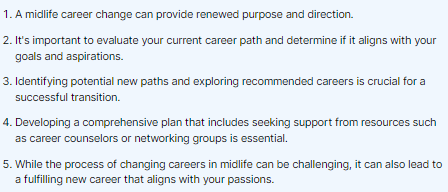Career Change At 40 – A Complete ‘How To’ Guide

Changing careers in midlife can be a daunting but rewarding experience. As people reach their 40s, they may begin to evaluate their current career path and determine if it aligns with their goals and aspirations. Some may realize that they want to make a change, whether it’s pursuing a new career or transitioning into a different field altogether. This process, known as a midlife career change, can lead to a fulfilling new career that aligns with one’s passions.
Career Change At 40 – Key Takeaways From This Post

A midlife career change can be a big decision that requires careful thought and planning. Many factors can influence the decision to change careers, such as burnout, lack of motivation, a desire for a new challenge, or wanting to pursue a long-held dream career. Whether it’s changing industries or moving up the ladder in a current field, a career transition at this point in life can bring a renewed sense of purpose and direction.
In this blog post, we will explore the challenges and rewards of a switching careers midlife . We’ll discuss how to evaluate your current career path, identify potential new paths, and plan for a career transition. We’ll also provide examples of recommended careers for career changers over 40 and discuss resources available to help make a successful transition. Whether you’re looking to change careers to pursue a passion or seeking a new challenge, this guide will help you navigate the journey of a midlife career change.
Here are some helpful career/leadership related blogs
- Careers– Agile Coach, RTE, Product Owner, Scrum Master, QA Manager
- Career development plan
- Career growth
- Project Management
- Managing Managers
- IT Career switch
- Software Engineering career path
- Agility, Agile Testing
- Remote leadership / Leadership traits / Agile leadership
The Challenges of Career Midlife Change

Making a career change later in life can present several challenges, including:
Additional Education or Training
- Depending on the new career path you choose, you may require a specific degree or certification that you do not currently possess.
- Pursuing this education can be costly, time-consuming, and emotionally draining.
Age Discrimination
- Some employers may be hesitant to hire older workers, assuming that they lack the technical skills or flexibility required in today’s fast-paced work environment.
- This bias can make it more challenging to secure job interviews and job offers, especially in industries that value youth and innovation.
Potential Pay Cut
- Making a career change later in life may require taking a pay cut or starting at a lower level than your current position.
- This loss of income can be difficult to manage, especially if you have financial obligations such as supporting a family or paying a mortgage.
Emotional Toll
- Leaving a familiar job or career path behind can be challenging, especially if you have invested many years into it.
- You may experience feelings of uncertainty, anxiety, and self-doubt as you navigate the unfamiliar terrain of a new career.
Despite these challenges, a midlife career change can be a rewarding and fulfilling experience. With careful planning, research, and support, you can overcome the obstacles and build a successful new career path that aligns with your passions and goals.
Factors to Consider When Making a Career Change at 40

Making a career change at 40 or later can be a significant decision that requires careful consideration. Here are some factors to think about:
Personal Interests
Your personal interests and passions should be a crucial factor in choosing a new path. Consider what you enjoy doing in your free time and what activities bring you the most satisfaction. If you have a genuine interest in your work, you are likely to feel more fulfilled and motivated in your new career.
Financial Considerations
Making a career change may require taking a pay cut or starting at a lower level than your current position. Before making a decision, it’s essential to consider your financial situation, including your current expenses, savings, and future financial goals. You’ll want to ensure that you can afford to take the necessary steps to pursue your new path, such as additional education or training.
Job Market Trends
It’s essential to consider current job market trends and potential growth opportunities in the field you’re interested in pursuing. Research the demand for jobs in your desired field, including salaries and employment rates. You’ll want to ensure that your new career path has good prospects for job security and advancement.
Potential Growth Opportunities
Consider the potential for growth and advancement in your new career path. Look for opportunities to learn new skills, take on more significant responsibilities, and advance within your chosen field. Consider the long-term prospects of your new career and whether it offers a clear path for career growth and development.
Work-Life Balance
Consider the work-life balance of your new career path. Look for jobs that offer flexible schedules, the ability to work remotely, or other benefits that align with your lifestyle needs. A career that offers a better work-life balance can help you achieve a better quality of life and reduce stress.
Transferable Skills
Think about your transferable skills, including communication, leadership, problem-solving, and other soft skills that can be used in various industries. Consider how you can leverage these skills in your new career and what additional skills or training may be required to make a smooth transition.
By taking the time to research and evaluate your options carefully, you can make an informed decision and build a successful new career path that aligns with your passions and goals.
Potential Careers – Career Change at 40

If you’re considering a midlife career change, there are many exciting and rewarding career paths to explore. The key is to find a new career that aligns with your interests, skills, and values. Here are some recommended careers for those looking to make a career change at 40:
Nursing
Nursing is a high-demand field that offers stable employment and excellent earning potential. As the population continues to age, the demand for healthcare professionals will only increase. Many nursing programs offer accelerated options for students with previous degrees or work experience, making it an attractive option for midlife career changers.
Web Development
Web development is a rapidly growing industry that offers ample opportunities for remote work and flexible schedules. With the increasing importance of digital marketing and e-commerce, companies are always in need of skilled web developers who can build, design, and maintain their websites.
Consulting Work
Consulting is a broad field that encompasses many specialties, including management, marketing, finance, and IT. As a consultant, you can use your previous work experience and knowledge to help companies solve problems and improve their operations. Many consulting firms welcome midlife career changers who can bring a fresh perspective and diverse set of skills to their teams.
Translation
If you are fluent in a second language, a career in translation may be an excellent choice for you. Translators work in a variety of settings, including government agencies, hospitals, and corporations, converting written or spoken content from one language to another. With the increasing globalization of business and communication, the demand for skilled translators is on the rise.
Medical Administrative Assistant
Medical administrative assistants play a vital role in healthcare settings, providing administrative support to doctors, nurses, and other medical professionals. This job involves scheduling appointments, managing patient records, and performing other clerical duties. It is a stable and rewarding career that does not require extensive education or training.
Patient Care Technician
Patient care technicians work closely with nurses and doctors to provide hands-on care to patients in hospitals and clinics. This job involves tasks such as taking vital signs, administering medication, and assisting with daily activities like bathing and dressing. Patient care technicians typically require a certification program of several months to a year.
Event Planning
If you have strong organizational skills and enjoy working with people, a career in event planning may be a great fit for you. Event planners help organize and execute weddings, conferences, festivals, and other special events. This job requires excellent communication skills, attention to detail, and the ability to work under pressure.
SEO Specialist
An SEO specialist is responsible for improving a company’s search engine rankings and increasing online visibility. This job involves analyzing website traffic, researching keywords, and optimizing website content for search engines. With the increasing importance of digital marketing, many companies are in need of skilled SEO specialists to help them grow their online presence.
UX/UI Designer
User experience (UX) and user interface (UI) designers create websites, apps, and other digital products that are easy to use and visually appealing. This job requires a combination of design skills, technical knowledge, and empathy for the end-users. As more companies move their businesses online, the demand for skilled UX/UI designers is on the rise.
Social Media Manager
Social media managers are responsible for managing a company’s social media presence, developing content strategies, and analyzing social media metrics. With the increasing importance of social media in business, many companies are in need of skilled social media managers to help them grow their online following.
Financial Analyst
Financial analysts work with companies to analyze financial data, evaluate investment opportunities, and make strategic financial decisions. This job requires strong analytical skills, attention to detail, and the ability to communicate financial information to non-financial stakeholders.
Graphic Designer
Graphic designers create visual concepts and designs for print and digital media. They work in a variety of industries, including advertising, publishing, and web design. This job requires a combination of artistic talent, technical knowledge, and creativity.
Personal Trainer
Personal trainers work with clients to create fitness plans, provide guidance on nutrition, and motivate them to achieve their fitness goals. This job requires an understanding of exercise science, excellent communication skills, and a passion for health and wellness.
Data Analyst
Data analysts work with large amounts of data to identify patterns, trends, and insights that can be used to inform business decisions. This job requires strong analytical skills, proficiency in data analysis tools like Excel and SQL, and an understanding of statistical modeling techniques.
Human Resources Manager
Human resources managers are responsible for overseeing the recruitment, training, and development of employees in an organization. This job requires excellent communication skills, knowledge of employment laws and regulations, and the ability to build relationships with employees and managers.
Copywriter
Copywriters write compelling and persuasive copy for advertisements, websites, and other marketing materials. This job requires strong writing skills, creativity, and an understanding of the target audience.
Real Estate Agent
Real estate agents help clients buy, sell, or rent properties. This job requires excellent communication skills, knowledge of the local real estate market, and the ability to negotiate deals on behalf of clients.
Interior Designer
Interior designers create functional and aesthetically pleasing spaces for homes, offices, and other buildings. This job requires a combination of artistic talent, technical knowledge, and an understanding of construction and building codes.
Landscape Architect
Landscape architects design outdoor spaces such as parks, gardens, and public spaces. This job requires creativity, knowledge of plant species, and an understanding of environmental factors that affect landscape design.
These are just a few examples of the many career change options available to midlife career changers. Whatever career path you choose, it’s essential to research your options, evaluate your skills and interests, and identify any necessary training or education required to succeed in your new field. With hard work, dedication, and perseverance, you can build a successful new career path that aligns with your passions and goals.
Resources for Career Change at 40

Making a career change at 40 or later can be a daunting task, but there are many resources available to help you navigate the transition successfully. Here are some resources you may find helpful:
Career Coaching Services
Career coaching services can provide valuable guidance and support as you navigate your career change. A career coach can help you identify your strengths and interests, develop a plan for your new career path, and provide accountability and motivation throughout the process.
Professional Networking Groups
Joining professional networking groups can help you connect with others in your desired industry and gain valuable insights into potential career paths. Many networking groups offer events, job boards, and mentorship opportunities that can help you build relationships and advance in your new career.
Bootcamps or Online Courses
Bootcamps and online courses can provide essential education and training in a specific industry, allowing you to learn new skills quickly and efficiently. Many bootcamps offer accelerated programs that can be completed in several weeks or months, making them an attractive option for midlife career changers who want to make a swift transition.
Industry Associations
Industry associations can provide valuable information and resources related to your desired career path. Many associations offer publications, conferences, and webinars that can help you stay up-to-date on the latest trends and developments in your industry.
Volunteer Opportunities
Volunteering can be an excellent way to gain practical experience and build connections in your desired industry. Look for volunteer opportunities that align with your career goals and interests, such as working with a nonprofit organization or participating in community service projects.
Informational Interviews
Informational interviews can provide valuable insights into your desired career path by allowing you to speak with professionals in the field. Reach out to individuals in your network or through professional networking groups to request an informational interview. Prepare specific questions about the industry, job duties, and required skills to make the most of your time.
Final Thoughts
A career change at 40 or later can be challenging, but with the right resources and mindset, it is possible to successfully navigate the transition. While it may seem daunting to start over in a new field, there are many recommended career options available for midlife career changers, including nursing, web development, consulting work, translation, medical administrative assistant, patient care technician, event planning, SEO specialist, and UX/UI designer.
When considering a career change, it’s important to weigh the personal interests, financial considerations, job market trends, potential growth opportunities, work-life balance, and transferable skills needed for success in your desired field.
By researching your options, evaluating your skills and interests, and identifying any necessary training or education required, you can make an informed decision and build a successful new career path that aligns with your passions and goals.
Finally, remember that success requires hard work, dedication, and perseverance. There will undoubtedly be challenges along the way, but by staying committed to your goals and leveraging the resources available to you, you can overcome obstacles and achieve your dreams.
With the right mindset and approach, a career change at 40 can be a rewarding and fulfilling experience, leading to a bright future full of new opportunities and possibilities.
Other Productivity / Tools posts that may interest you
- Productivity
- Book summary apps – Headway App vs Blinkist vs getAbstract
- AI Writers: / Blogging – Jasper, Writesonic, Article Forge , Copy AI, Anyword, Writecream, Copymatic, Quillbot, Peppertype, Jasper AI (pricing) &
- Work From Home tools: Jabra
Author also writes at his Medium site.





